
oday, we have the honor of meeting Lorette C. Luzajic, writer, editor, educator, and visual artist extraordinaire in Toronto, Canada. Lorette studied journalism at Ryerson University in Toronto but preferred creating and exhibiting mixed media art to the newsroom. Her prose poetry and flash fiction, mostly ekphrastic, have appeared in about a dozen anthologies, and hundreds of journals, including Cultural Weekly, Macqueen's Quinterly, and Indelible, among many others. Her work has been published twice in Best Small Fictions, and she’s been nominated five times each for Best of the Net and the Pushcart Prize, three times for Best Microfiction, four for Best Small Fictions and seven for Best American Food Writing. Her latest books are collections of ekphrastic prose poems and small stories: Winter in June and Pretty Time Machine.
Lorette is also an award-winning visual artist whose work is regularly shown in Toronto and nearby, and has also been exhibited in Mexico, Tunisia, Chicago, Los Angeles, Edinburgh, Ireland, Australia, in a magazine ad campaign for Madrid-based jewelry company Carrera Y Carrera, on the Marilyn Denis show, and as a 20 ft. billboard in New Orleans. Her art has been collected in at least 30 countries, from Peru to Saudi Arabia.
WOW: Thank you so much for agreeing to be interviewed for WOW. I’m sure our readers will be as thrilled as I am to learn more about you and the intriguing field of ekphrastic writing, which is defined as the “practice of using visual art as a literary device.” It’s so interesting that people have been doing ekphrastic writing for 3,000 years! Can you give us an early example?
Lorette: Thank you, Ashley, and WOW. I’m always thrilled to bring the magic of ekphrasis to wider audiences and to bring our amazing writers to more readers.
Ekphrasis is a word from the Greek that simply means “to describe.” It is easier to understand why it was an important element of ancient literature by considering the context of history. If someone saw a work of art, the only way to show others was to describe it to them. You didn’t have museum postcards, coffee table books, or Instagram sharing! So ekphrasis is naturally a part of poetry and other writing going way back. The epics contain ekphrases, such as descriptions of Juno temple carvings in Virgil’s Aeneid, and famously, Achille’s shield in Homer’s Iliad.
The Ekphrastic Review has pushed the boundary of traditional ekphrases by expanding the definition, something writers were already doing. We believe that any literature inspired by art is ekphrastic today and does not have to describe or be about the artwork. In an era of ubiquitous imagery, using art to inspire our imaginations in different ways doesn’t feel limited to “showing” the art since it can easily be seen by many.
WOW: I loved the fact that you received so many quality entries in The Ekphrastic Review’s recent Nine Lives Marathon writing contest that you chose to publish a piece from every writer who submitted. I can only imagine the amount of work that went into such an endeavor! With so many impressive entries, how hard was it to choose a winner? (John L. Stanizzi wrote the prize-winning poem, “What Happens When I Arrive?” and Norbert Kovacs wrote the prize-winning prose, “Private Island.”)
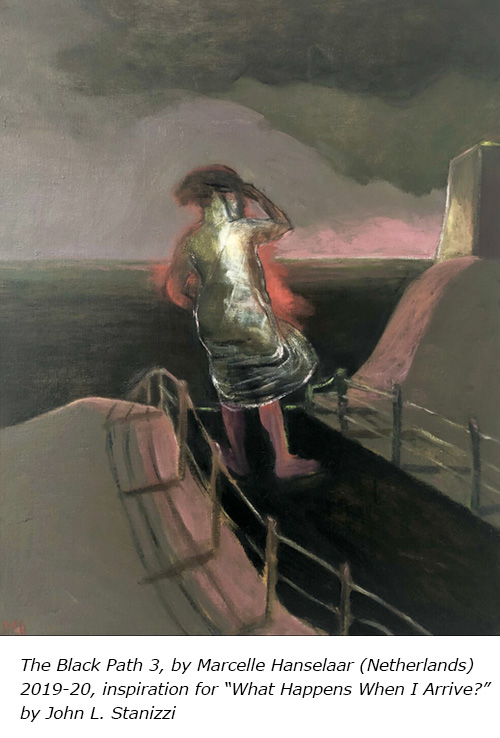 Lorette: To celebrate the journal’s seventh birthday a few years ago, we decided to have a marathon and write a ridiculous number of drafts in sprints. It was a creative experiment inspired by the brilliant writer Meg Pokrass as a way to get rid of the blank page! The marathon was intense and incredible, so we decided to have one annually around the time of our birthday. This year we turned nine, so it was the Nine Lives edition.
Lorette: To celebrate the journal’s seventh birthday a few years ago, we decided to have a marathon and write a ridiculous number of drafts in sprints. It was a creative experiment inspired by the brilliant writer Meg Pokrass as a way to get rid of the blank page! The marathon was intense and incredible, so we decided to have one annually around the time of our birthday. This year we turned nine, so it was the Nine Lives edition.
This sparked an eight-hour day with the goal of writing fourteen different drafts of poetry or flash fiction. The objective is not to have perfect pieces but to brainstorm and sweat in pure creativity, a day for writers to experiment, explore, and play, rather than edit, revise, and overthink. The emphasis is on doing the marathon rather than on the merit or outcome. Salvageable drafts can be transformed later, or they may blossom into something later. Writers who choose to can submit and we select some for publication, as well as a prizewinner in poetry and in prose.
This year, the choices for winner were up to other TER editors, Kate Copeland and Sandi Stromberg. They are amazing! They chose from the final selections in each category. Choosing a winning poem or story is always subjective, going with works that speak to us individually, as well as looking at originality, surprise, impact, style, creativity and much more.
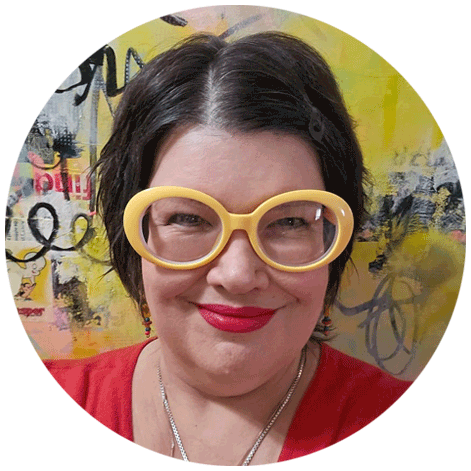
“Show us something different. Make us feel what you felt when an artwork spoke to you. We want more ekphrastic flash fiction, more ekphrastic creative nonfiction. Send us stories!”
WOW: Do you choose the artwork or do writers have the option of writing about any piece that inspires them? And if you (the editor) choose the art, how do you do it? Do you share the work of your writers with the artist, and if so, what is their reaction?
Lorette: Writers submitting to the daily stream of The Ekphrastic Review can send work inspired by any work of visual art, so we get a wide variety because different artworks move or inspire different people in different ways!
The challenge stream of the journal is a bimonthly edition. For this, we post a curated work and writers everywhere respond to it. I look for art that might challenge writers in unexpected directions. I love showing them work that grows as you contemplate it, inviting them to discover art more deeply. I want to choose a variety of pieces from famous and beloved standards to obscure surprises. I want to show art from different eras, from different parts of the world, and I want to surprise them with the variety of art by women that has often been overlooked.
We need permission to publish artworks by contemporary, living artists, so in seeking that, they definitely enjoy reading what they have inspired.
WOW: I love the way you unite the work of artists, that of the writer and the visual artist. I understand you started your career by studying journalism, another interesting intersection. I’m so curious—what inspired your migration into the world of visual art?
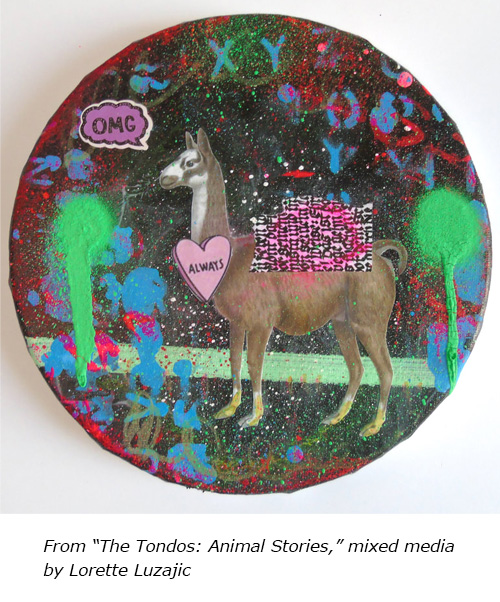 Lorette: My nature is creative and expansive, and I was writing poetry and studying art history for as long as I can remember. Journalism was my attempt to do something “sensible” in a related field. I was perhaps quite naïve at the time and thought I could do juicy creative pieces about art and writers. Journalism is very competitive, and the vast majority of the field is about business and politics. I hate business and politics!
Lorette: My nature is creative and expansive, and I was writing poetry and studying art history for as long as I can remember. Journalism was my attempt to do something “sensible” in a related field. I was perhaps quite naïve at the time and thought I could do juicy creative pieces about art and writers. Journalism is very competitive, and the vast majority of the field is about business and politics. I hate business and politics!
But in an unexpected way, the intense, deadline-driven education has worked perfectly for me. I have become incredibly disciplined about work and work best to deadlines, imposing them on myself if there is no boss to do so. The stereotype of artists being late and chaotic fits my nature well, but I have become a machine and work to a schedule.
Making art was a happy accident. A passion for both art and literature has always been part of me and part of my lifelong studies. I made all kinds of things but didn’t call myself an artist, rather, a writer. But after school, realizing I couldn’t possibly work for a newspaper, I needed to feed my anxious soul with creation. Ultimately, all the things I loved and learned merged in a unique path. I don’t really see my artmaking, writing, editing, publishing, and teaching separately. They all come from the same well.
WOW: And this passion makes for one busy lady! In addition to The Ekphrastic Review, you also founded and run The Mackinaw, a bimonthly magazine of prose poetry that just launched In January of this year. How do you find the time to do both?
Lorette: I do not have enough time! I am always scrambling. For me, everything has always been excessive. I am a maximalist. I have tried streamlining, prioritizing, paring back. I keep umpteen running lists that I can’t ever catch up to. There are always new ideas and projects, and I just dive in. Some can take quite a long time to complete as I am scattered in many directions, but eventually it comes together. Throwing more on my plate was ridiculous. I tried to quash The Mackinaw for several years and the dream of it got more and more intense. I wanted a platform for prose poetry, a form I love, to hold space for so many of my favorite writers working in the form.
Sometimes I’m cursing myself when I’m overwhelmed. I need to have time for my art practice, for marketing my art, for my writing, and for teaching, because I have to pay my rent and bills. But it’s really important to me to show off the talents of others and work to showcase their brilliance. I think about the art dealers and galleries who make space for my paintings and spend their time showing them to the world. I want to do this as part of my practice, in this case with writers. It’s a small contribution but every space where writers connect with readers is meaningful and important.

“I am a maximalist. I have tried streamlining, prioritizing, paring back. I keep umpteen running lists that I can’t ever catch up to. There are always new ideas and projects, and I just dive in.”
WOW: I loved the story behind the name of The Mackinaw, and the fact that it was inspired by a peach in an episode of Seinfeld! For our readers, do you mind giving the backstory?
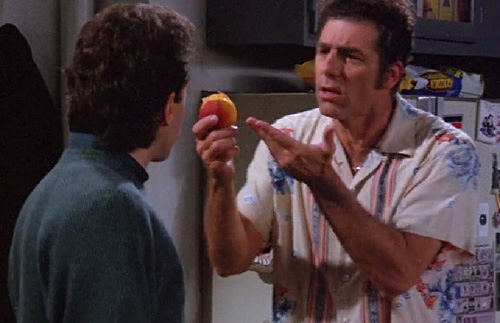 Lorette: There have been ongoing arguments about prose poetry anywhere it exists. Lurking on various conversations on social media about the form, I sometimes felt amusement that this rebel style garnered so much contention. In the “About” section of The Mackinaw, I state, “Many writers and readers declare prose poetry the most delicious of all poetry, and yet others say it doesn't even exist.” The title is a reference to the Seinfeld episode about the Mackinaw peaches, which were the sweetest of all peaches, yet were a complete fiction of the show. I have an impish sense of humor and thought it was a perfect name for a journal of prose poetry.
Lorette: There have been ongoing arguments about prose poetry anywhere it exists. Lurking on various conversations on social media about the form, I sometimes felt amusement that this rebel style garnered so much contention. In the “About” section of The Mackinaw, I state, “Many writers and readers declare prose poetry the most delicious of all poetry, and yet others say it doesn't even exist.” The title is a reference to the Seinfeld episode about the Mackinaw peaches, which were the sweetest of all peaches, yet were a complete fiction of the show. I have an impish sense of humor and thought it was a perfect name for a journal of prose poetry.
WOW: From one peach lover to another, I love it! Prose poetry is such a dynamic field, and it seems the definition is changing constantly. What is your definition of prose poetry?
Lorette: Simply put, a prose poem is a poem written in prose. Prose poetry is prose, but it is also poetry. It is not either/or. It is both. It uses all kinds of techniques, traditions, and elements of poetry, except lines.
WOW: Are pieces in The Mackinaw also considered ekphrastic or can writers write about anything they choose?
Lorette: All kinds!

“[The Mackinaw] is a reference to the Seinfeld episode about the Mackinaw peaches, which were the sweetest of all peaches, yet were a complete fiction of the show. I have an impish sense of humor and thought it was a perfect name for a journal of prose poetry.”
WOW: Excellent. So tell me, what do you do when you’re not writing, editing or making art?
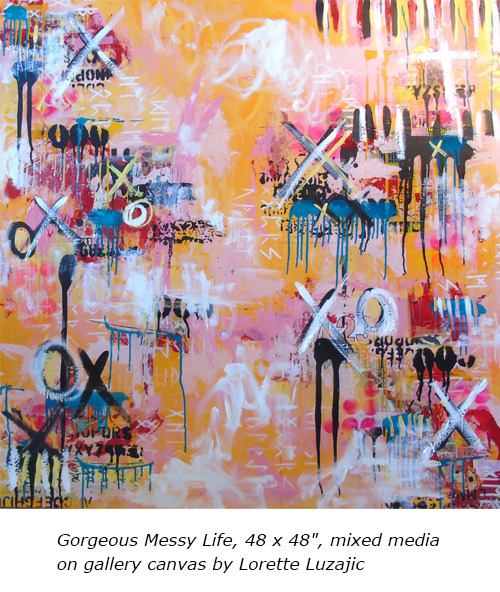 Lorette: Reading, writing, creating, and teaching on these things is the core of me, and I am not happy if I’m not doing them all the time, full throttle. Most of my other interests or activities are connected. I love archeology and artifacts and museum stuff. I’m passionate about the history of jewelry and obsessed with rings, and I love cats. I swim several times a week. I love spending some time in good conversation with family and friends. I love good wine and global cuisine. I love to travel. I constantly take night classes or online courses. I also enjoy detective television.
Lorette: Reading, writing, creating, and teaching on these things is the core of me, and I am not happy if I’m not doing them all the time, full throttle. Most of my other interests or activities are connected. I love archeology and artifacts and museum stuff. I’m passionate about the history of jewelry and obsessed with rings, and I love cats. I swim several times a week. I love spending some time in good conversation with family and friends. I love good wine and global cuisine. I love to travel. I constantly take night classes or online courses. I also enjoy detective television.
WOW: You have such fascinating dimensions—and I sense that just like your artwork above, you are indeed living the most gorgeous and messy life! Our readers will be so happy to know that both of your journals are currently accepting submissions right now. What advice do you have for writers hoping to break into either one?
Lorette: The Ekphrastic Review receives submissions four times a year, including October. The Mackinaw receives submissions anytime. We publish two special showcases monthly for the challenges. If you are inspired by the challenge artworks, these are a great bet because we want to publish a wide variety of voices for each work.
Your best bet for the daily stream of the journal is to surprise us. Another poem about Van Gogh must really wow us. Show us something different. Make us feel what you felt when an artwork spoke to you. Also, we love poetry, but more than three quarters of our submissions are poetry and we want more ekphrastic flash fiction, more ekphrastic creative nonfiction. Send us stories!
The Mackinaw format is going to change next year to publishing multiple works by a single poet every Monday, rather than having editions. It’s proving to be a bit tricky from a technical perspective on the site, and having the weekly showcase will make the works more accessible in the future, for people to share and absorb. Our format so far has been bimonthly issues with a dozen writers, but multiple poems by each writer. So we are looking at a body of work, rather than single pieces. We want to run three to ten prose poems per poet and give readers a nice, juicy portion of the writer’s work. So that means having a handful of strong pieces to submit together. And they must be prose poems! It’s amazing how many other forms we get. If your poem has lines, it is not a prose poem!
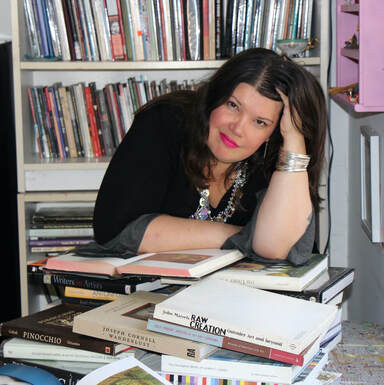 WOW: You also enjoy teaching, and we’re honored that you agreed to lead two classes for WOW, Hooked on Ekphrasis: Creating Writing from Visual Art starting October 9 and Writing Prose Poetry starting November 4, which both sound fascinating. How does teaching complement your work as a writer, editor and artist?
WOW: You also enjoy teaching, and we’re honored that you agreed to lead two classes for WOW, Hooked on Ekphrasis: Creating Writing from Visual Art starting October 9 and Writing Prose Poetry starting November 4, which both sound fascinating. How does teaching complement your work as a writer, editor and artist?
Lorette: I love teaching because I want to be a doorway and an invitation into an enchanted realm of creativity. If I can point to a path where someone discovers an artist that inspires them or writes a story that was dying to be told or finds a poem that they carry in their pocket, that is everything.
WOW: Incredible. You are such an inspiration, and we so appreciate the exciting channels you’ve created for writers everywhere. Thank you so much for letting us spend time in your enchanted realm today. We look forward to watching you continue to soar in all that you do.
Lorette: You are so welcome, Ashley. It’s been a pleasure!
For more about Lorette and to see more of her work, and I highly recommend that you do, please visit her website at www.mixedupmedia.ca.
Remember that The Ekphrastic Review’s next submission period is in October; and The Mackinaw’s submissions are accepted on a rolling basis. Get your best work together and send it to Lorette and her team!
If you’d like to learn more about the art of writing and publishing ekphrastic work, don’t miss Lorette’s four-week Zoom workshop, Hooked on Ekphrasis: Creating Writing from Visual Art starting October 9. For writers interested in penning prose poetry, Lorette’s four-week Zoom workshop Writing Prose Poetry starts November 4. Both are generative and bound to inspire magical writing!
***

Ashley Harris has written for numerous magazines and journals, including Wired, Real Simple, Carve, and her longform essay, “Buy Now: The Summer of My Shoe Obsession” just appeared in the Summer 2024 print edition of the N.C. Literary Review. She is also a regular contributor to Healthline’s Bezzy MS column, and her essay, “How Studying Johannes Vermeer Inspired Me to Live My Best Life with MS” will be published later this month. She lives in southwestern Randolph County, North Carolina, with her sculptor husband. She has three dogs and one cat, but her world will not be complete until she rescues at least one wild panda. Having three bamboo groves means that she is ready! For more, see ashley-harris.com.